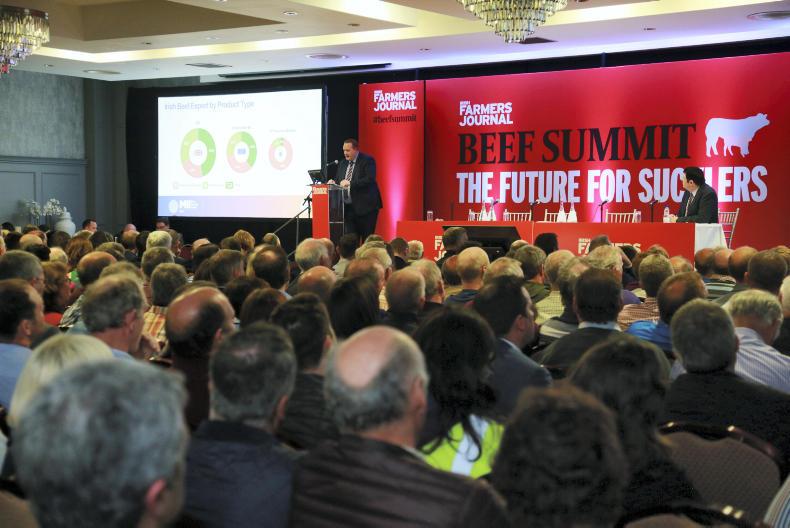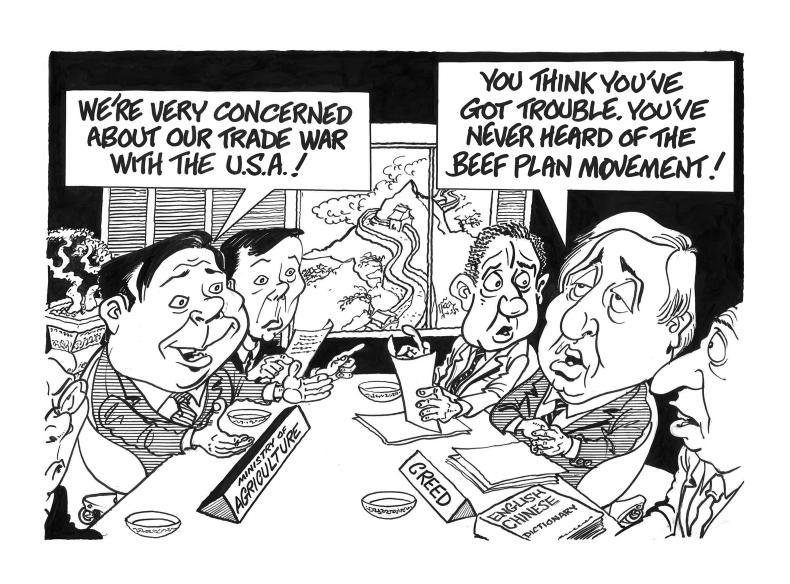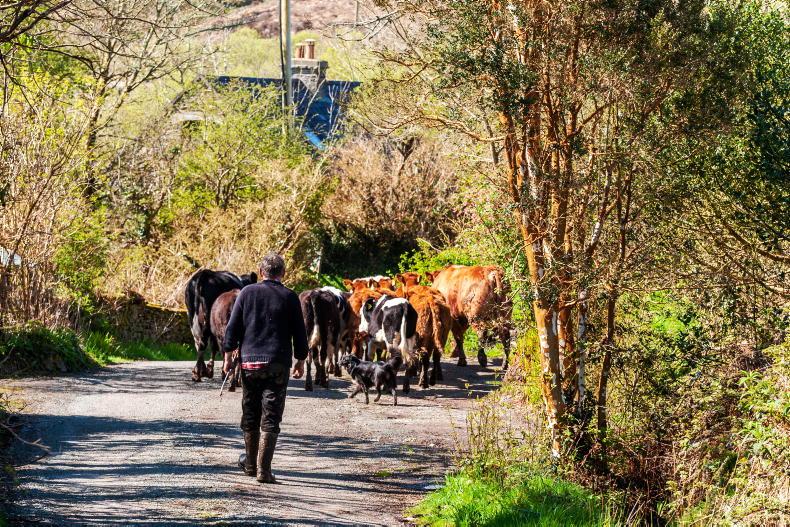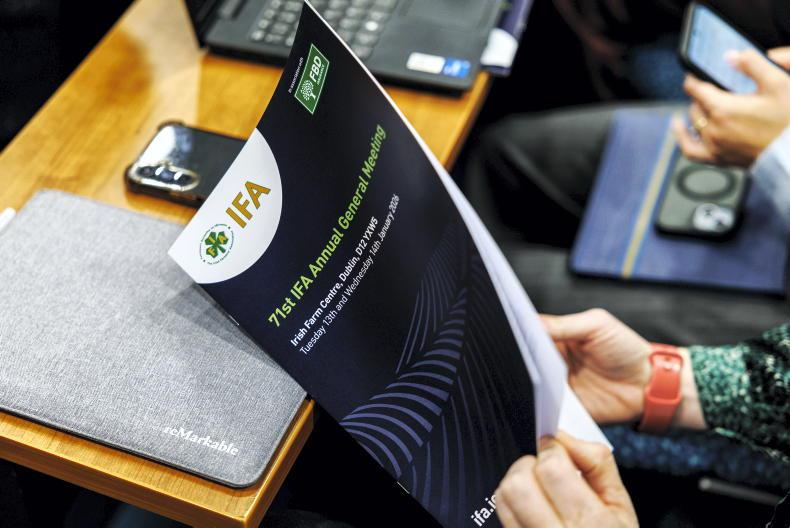With over 1,300 farmers in attendance, the Irish Farmers Journal Beef Summit turned out to be one of the largest farmer gatherings in recent years. It was also perhaps one of the most highly charged.
While the heckling of speakers made for an uncomfortable evening, we should not overlook the fact that the majority of the hecklers were farmers facing real financial challenges – a fact that was brought home to me during the one-to-one conversations at the end of the night.
There were farmers in the audience who were under immense pressure, some having accepted a beef price of close to €3/kg for dairy-bred bulls earlier in the spring. In these situations, the losses were real and the implications on their families severe.
One farmer in particular explained how he has yet to tell his daughter – or indeed his wife – that the money needed for her to go to university next autumn simply wouldn’t be there due to the losses incurred on the farm over the last few months.
Against this backdrop, it is understandable that some used the Beef Summit as a means of venting their anger towards key stakeholders in the industry. To their credit, each of our speakers fully accepted and acknowledged this fact – none more so than Minister for Agriculture Michael Creed.

The Irish Farmers Journal Beef Summit. \ David Ruffles
The minister gives an extremely candid assessment of the Beef Summit here. It is a long time since we have seen any minister convey his thoughts on any subject or sector so openly. It is refreshing to hear a minister accept that he doesn’t have all the answers and acknowledge that perhaps policy positions require revision.
The minister’s comments, recognising the need for immediate supports for beef farmers and the potential role for coupled payments to address the income challenge on suckler farms, show that he is listening and in the case of the beef supports, prepared to deliver.
At the same time, he does not miss the opportunity to push back. He is right to point out that the challenges facing suckler beef production will only be solved if the industry responds together. He highlights the very serious issue that processors face in having such a poor relationship with their farmer suppliers. Such a direct and pointed criticism by a minister carries more weight than some may realise. While he cannot intervene on price, the minister does have levers he can use to apply significant pressure. The diplomatic work he is doing this week to promote market access and development in China is of critical importance to the processing sector.
Minister Creed has also shone the spotlight on farm organisations and their need to show real leadership. This extends beyond merely articulating farmer anger.
Leadership is about providing solutions and direction and, where necessary, going against the popular opinion.
The minister has laid down a challenge to farm organisations to come to the table with realistic proposals that are fit for purpose. This was exactly the approach adopted by the IFA in relation to securing compensation for beef farmers and it delivered.
Some will be quick to dismiss the minister’s apparent renewed vigour to roll up the sleeves and tackle the challenges as reactionary. However, farmers would be wrong not to put him to the test.
There is no one silver bullet that will address the income challenge on suckler and beef farms. An extra 50c/kg in the beef price would push some but not all into the black – the same goes for the introduction of coupled payments.
Change is required if we are to generate a profit from suckling – change in policy, change in pricing model and changes to the production system. But it won’t happen by accident.
It requires a clear strategy to be developed specifically for the suckler beef sector, with each stakeholder accepting responsibility for their role. It will require a mature conversation on what the national herd will look like into the future.
While change is never easy, the Beef Summit will have been a failure if we just continue with the status quo.
Tillage: putting fertiliser manufacturers ahead of farmers
The decision by European Commissioner for Trade Cecilia Malmström to impose provisional anti-dumping duties on imports of UAN fertiliser (a liquid form of nitrogen containing urea, ammonia and nitrate) raises serious questions as to the commitment within the Commission to protect farm incomes.
The Commission’s own analysis shows the measure could represent an increase of 3-5% in the cost of production at farm level, while French wheat producers indicate the impact could be as high as 12% – effectively reducing profitability of the sector by 50-100%.
The only apparent justification for the imposition of such measures is to further inflate the already double-digit profit margins being achieved by the €20bn EU fertiliser industry.
For the second time, we have seen European Commissioner for Agriculture Phil Hogan intervene on the issue, having once again written to European Commissioner for Competition Margrethe Vestager expressing concerns with respect to competition rules in the fertiliser market and the impact on farmer income.
As Paul Mooney reports, the IFA continues to highlight the issue, accusing Fertiliser Europe of displaying a flagrant disregard for EU family farm businesses, pointing out that their campaign for anti-dumping duties on UAN will cost farmers €2.7bn.
Serious questions have to be asked as to why the Commission is prepared to impose tariffs and anti-dumping measures to protect a highly concentrated EU fertiliser industry where business practices have been called into question.
With a high-output grass and arable based production model, Irish farmers are uniquely exposed to these trade-distorting measures. Faced with some of the highest prices in the world, Irish farmers are now spending €543m per annum on fertiliser, which, according to IFA figures, is an increase of 54% over the last two decades.
While anti-dumping measures and fertiliser tariffs are issues that are a long way from the farm gate, EU policy on both will have a major influence on farm profitability. The IFA campaign is forcing a political focus on these key issues which will no doubt intensify with Commissioner Hogan’s recent intervention.
Kerry co-op: shares scheme in the spotlight
Also this week, Lorcan Allen reports on the Kerry Co-op cash for shares scheme. Individual co-op shareholders need to carefully consider the impacts of this scheme as there could be significant tax implications now and into the future.
The co-op is in a tricky situation. In order to transfer wealth from the co-op, which is now valued at €2.4bn, it is now faced with fewer options than before because it has lost its co-op trading status, known by Revenue as Section 701.
This is a problem that was created by allowing non-farmers (investors and business people) purchase shares in the co-op over the years on an unregulated grey market where the see-through value was much higher.
It raises a larger question for co-op boards around who should be allowed own or buy shares in a co-op. Ultimately, any new shareholders in a co-op should be the next generation of farmers coming through.
Dairy: milk price increase?
While the trend is towards processors holding April milk price, the mood at a dairy conference in London was optimistic. As Jack Kennedy reports, the weak EU market was shown to be at odds with a rising GDT, lower production in New Zealand and Australia as well as strong Chinese demand.
Greenfield Farm: open day postponed
Discussions are ongoing between shareholders in the Greenfield Dairy Programme on the future of the project. To facilitate these discussions, the Irish Farmers Journal – in consultation with Teagasc – has decided to postpone a planned information event on the farm on 28 May.
With over 1,300 farmers in attendance, the Irish Farmers Journal Beef Summit turned out to be one of the largest farmer gatherings in recent years. It was also perhaps one of the most highly charged.
While the heckling of speakers made for an uncomfortable evening, we should not overlook the fact that the majority of the hecklers were farmers facing real financial challenges – a fact that was brought home to me during the one-to-one conversations at the end of the night.
There were farmers in the audience who were under immense pressure, some having accepted a beef price of close to €3/kg for dairy-bred bulls earlier in the spring. In these situations, the losses were real and the implications on their families severe.
One farmer in particular explained how he has yet to tell his daughter – or indeed his wife – that the money needed for her to go to university next autumn simply wouldn’t be there due to the losses incurred on the farm over the last few months.
Against this backdrop, it is understandable that some used the Beef Summit as a means of venting their anger towards key stakeholders in the industry. To their credit, each of our speakers fully accepted and acknowledged this fact – none more so than Minister for Agriculture Michael Creed.

The Irish Farmers Journal Beef Summit. \ David Ruffles
The minister gives an extremely candid assessment of the Beef Summit here. It is a long time since we have seen any minister convey his thoughts on any subject or sector so openly. It is refreshing to hear a minister accept that he doesn’t have all the answers and acknowledge that perhaps policy positions require revision.
The minister’s comments, recognising the need for immediate supports for beef farmers and the potential role for coupled payments to address the income challenge on suckler farms, show that he is listening and in the case of the beef supports, prepared to deliver.
At the same time, he does not miss the opportunity to push back. He is right to point out that the challenges facing suckler beef production will only be solved if the industry responds together. He highlights the very serious issue that processors face in having such a poor relationship with their farmer suppliers. Such a direct and pointed criticism by a minister carries more weight than some may realise. While he cannot intervene on price, the minister does have levers he can use to apply significant pressure. The diplomatic work he is doing this week to promote market access and development in China is of critical importance to the processing sector.
Minister Creed has also shone the spotlight on farm organisations and their need to show real leadership. This extends beyond merely articulating farmer anger.
Leadership is about providing solutions and direction and, where necessary, going against the popular opinion.
The minister has laid down a challenge to farm organisations to come to the table with realistic proposals that are fit for purpose. This was exactly the approach adopted by the IFA in relation to securing compensation for beef farmers and it delivered.
Some will be quick to dismiss the minister’s apparent renewed vigour to roll up the sleeves and tackle the challenges as reactionary. However, farmers would be wrong not to put him to the test.
There is no one silver bullet that will address the income challenge on suckler and beef farms. An extra 50c/kg in the beef price would push some but not all into the black – the same goes for the introduction of coupled payments.
Change is required if we are to generate a profit from suckling – change in policy, change in pricing model and changes to the production system. But it won’t happen by accident.
It requires a clear strategy to be developed specifically for the suckler beef sector, with each stakeholder accepting responsibility for their role. It will require a mature conversation on what the national herd will look like into the future.
While change is never easy, the Beef Summit will have been a failure if we just continue with the status quo.
Tillage: putting fertiliser manufacturers ahead of farmers
The decision by European Commissioner for Trade Cecilia Malmström to impose provisional anti-dumping duties on imports of UAN fertiliser (a liquid form of nitrogen containing urea, ammonia and nitrate) raises serious questions as to the commitment within the Commission to protect farm incomes.
The Commission’s own analysis shows the measure could represent an increase of 3-5% in the cost of production at farm level, while French wheat producers indicate the impact could be as high as 12% – effectively reducing profitability of the sector by 50-100%.
The only apparent justification for the imposition of such measures is to further inflate the already double-digit profit margins being achieved by the €20bn EU fertiliser industry.
For the second time, we have seen European Commissioner for Agriculture Phil Hogan intervene on the issue, having once again written to European Commissioner for Competition Margrethe Vestager expressing concerns with respect to competition rules in the fertiliser market and the impact on farmer income.
As Paul Mooney reports, the IFA continues to highlight the issue, accusing Fertiliser Europe of displaying a flagrant disregard for EU family farm businesses, pointing out that their campaign for anti-dumping duties on UAN will cost farmers €2.7bn.
Serious questions have to be asked as to why the Commission is prepared to impose tariffs and anti-dumping measures to protect a highly concentrated EU fertiliser industry where business practices have been called into question.
With a high-output grass and arable based production model, Irish farmers are uniquely exposed to these trade-distorting measures. Faced with some of the highest prices in the world, Irish farmers are now spending €543m per annum on fertiliser, which, according to IFA figures, is an increase of 54% over the last two decades.
While anti-dumping measures and fertiliser tariffs are issues that are a long way from the farm gate, EU policy on both will have a major influence on farm profitability. The IFA campaign is forcing a political focus on these key issues which will no doubt intensify with Commissioner Hogan’s recent intervention.
Kerry co-op: shares scheme in the spotlight
Also this week, Lorcan Allen reports on the Kerry Co-op cash for shares scheme. Individual co-op shareholders need to carefully consider the impacts of this scheme as there could be significant tax implications now and into the future.
The co-op is in a tricky situation. In order to transfer wealth from the co-op, which is now valued at €2.4bn, it is now faced with fewer options than before because it has lost its co-op trading status, known by Revenue as Section 701.
This is a problem that was created by allowing non-farmers (investors and business people) purchase shares in the co-op over the years on an unregulated grey market where the see-through value was much higher.
It raises a larger question for co-op boards around who should be allowed own or buy shares in a co-op. Ultimately, any new shareholders in a co-op should be the next generation of farmers coming through.
Dairy: milk price increase?
While the trend is towards processors holding April milk price, the mood at a dairy conference in London was optimistic. As Jack Kennedy reports, the weak EU market was shown to be at odds with a rising GDT, lower production in New Zealand and Australia as well as strong Chinese demand.
Greenfield Farm: open day postponed
Discussions are ongoing between shareholders in the Greenfield Dairy Programme on the future of the project. To facilitate these discussions, the Irish Farmers Journal – in consultation with Teagasc – has decided to postpone a planned information event on the farm on 28 May.












SHARING OPTIONS